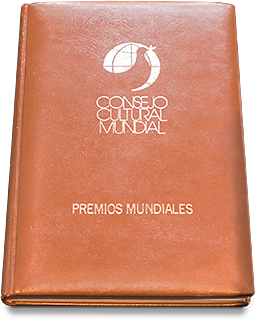
 Albert Einstein World Award of Science 2012
Albert Einstein World Award of Science 2012
Field of Research: Solar Energy Conversion
Date: 18 April 2012
Place of Ceremony: The Main Hall
Host Institution: Aarhus University
Host Country: Aarhus, Denmark
Professor Michael Grätzel’s achievements meet the qualifications for the Albert Einstein World Award of Science most closely in respect to “true benefit and wellbeing to humankind” through their importance to development of much-needed alternative energy sources.
Grätzel cells are likely to play a major role in low-cost, large-scale solutions for renewable energy. Besides photovoltaics, the concepts of Grätzel cells can also be applied in batteries and hydrogen production, all important components of future energy needs. The excellent price/performance ratio of these novel devices gives them major potential as a significant contributor to the diverse portfolio of future energy technologies. On the basis of cost, efficiency, stability and availability, as well as environmental compatibility, DSC cells are a viable contender for large-scale solar energy conversion systems.
Since his appointment as Professor of Physical Chemistry at the Ecole Polytechnique Fédraie de Lausanne in 1977, Michael Grätzel’s research has been dedicated to the conversion of solar energy. His results in the field of the photodissociation of water into hydrogen and oxygen, as well as his discovery of a process for the low temperature methanation of carbon dioxide, gained him broad international recognition and spurred a global research momentum that has led to several thousand scientific articles on redox photocatalysis.
The impact of Professor Grätzel’s work on scientific literature and the orientation of his research is extremely weighty; he is currently one of the most cited scientists on a global scale in chemistry and the material sciences.
Professor Grätzel has received wide recognition for his scientific excellence. He is honorary doctor or professor of eleven universities worldwide. He has been awarded several major science prizes, among them the European Grand Prize of Innovation and Technology (2000), Faraday Medal of the Royal Society of Chemistry (2001), the Balzan Prize (2009), the one million euro Millennium Technology Grand Prize (2010) and most recently the Gutenberg Research Award (2011).
His publications and patents include over 900 research papers in peer-reviewed scientific journals and 60 reviews or invited book chapters. He is the inventor or co-inventor of over 50 patents and the editor, author or co-author of three books. His publications have received 82,661 citations, placing him amongst the 10 most highly cited chemists in the world.
Chemistry for energy is currently one of the most important research topics for the future of our society and for humankind worldwide.


